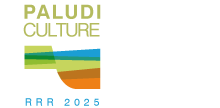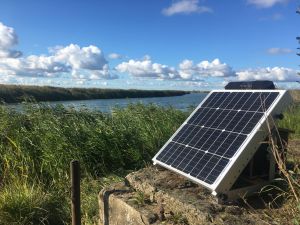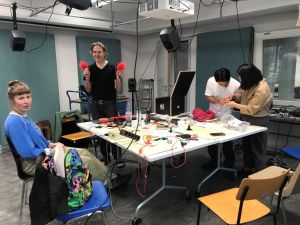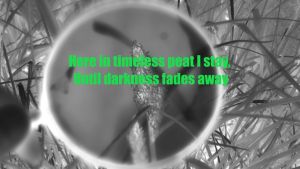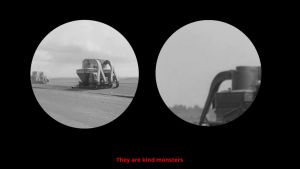Side events
Schöne Grüße aus dem Moor / Greetings from peatlands
Participatory Postcard Project - 7 p.m. at Conference Dinner in STRAZE
Send a greeting from peatlands to friends and family - right from RRR2025, analogue and with an arty aspect to it: The project "Schöne Grüße aus dem Moor" (Greetings from the mire) invites you to do so during the conference dinner.
The project portrays people's memories of life in and with peatlands and their fascination with this natural environment. Over several months, three artists - photographer Juliane Eyrich, radio artist Norbert Lang and poet Lisa Vera Schwabe - visit peatlands and people around Malchin (Mecklenburg-Vorpommern, Germany) to take photographs, conduct interviews, record sounds and collect stories. This research will result in an online peatland visual and sound archive – and a set of 15-20 postcards containing texts, images, and QR codes referring to the project's website. This set of 20 audio postcard will be finalized in 2026. At RRR2025, the artists present their interim result of first three postcards.
Cultural evening on Thursday, September 25 at 7.30 pm in the lecture hall building
radio.earth
Listening to change - 7:30 p.m. 25th Sept Lecture hall
A participatory art and radio project centered on the ecological crisis and its perception
The project emphasizes the acoustic, using listening as its core practice. By listening to areas with diverse land-use intensities - ranging from natural spaces to agrarian, urban, and industrial zones - the project aims to expand knowledge and sensitivity about changing natural conditions. radio.earth utilizes live acoustic microphones to transmit the audible environment with pristine quality to the internet via cell networks. Listeners can comprehensively experience the soundscape of various places, including their natural and environmental sounds throughout changing seasons. While on air, live broadcasts are announced, exchanged and discussed within an international chat group of artists, researchers and individuals. https://radio.earth
KoosMic
Live: https://radio.aporee.org/koosmic
In autumn and winter 2024/25, the KoosMic permanent listening station was established on the island of Koos near Greifswald, in a coastal peatland area managed by the Michael Succow Foundation and scientifically monitored by the Greifswald Mire Centre. The station was initiated by Udo Noll and set up together with students from the Department of Acoustic Ecology, Bauhaus University Weimar under the professorship of Kerstin Ergenzinger.
During the conference, we will listen live to the island’s soundscape and selected recordings from recent months, and elaborate on concepts and practises around Acoustic Ecology and the radio.earth project.
Udo Noll is a media artist and graduated as a qualified engineer for photography and media technology at the Cologne University of Applied Sciences. He lives and works in Berlin and Cologne and is the founder and developer of radio aporee, a platform for projects and practice in the areas of field recording, sound art and experimental radio.
Kerstin Ergenzinger is a sonic and visual artist and Junior Professor of Acoustic Ecologies and Sound Studies at Bauhaus University Weimar. She works across the fields of sound, sculpture, kinetics, light and drawing and explores the diversity of sensory ecologies and the possibilities of tuning into the differences of the world. www.nodegree.de/
Links to further information:
Acoustic Ecologies and Sound Studies
Pictures by Udo Noll
In Zombie Fire
Screening and Talk - 19:30 p.m. 245h Sept Lecture hall
with filmmaker and researcher Jeanna Kolesova and Suza Husse, coordinator of the transdisciplinary arts and research platform Sensing Peat
A haunting journey through Europe's forgotten peatlands, In Zombie Fire reclaims suppressed histories of environmental degradation, labour, and imperial domination, imagining non-extractivist futures through experimental documentary storytelling.
Jeanna Kolesova’s experimental documentary film In Zombie Fire investigates how imperial narratives endure in energy extraction, centering on the overlooked history and ecological scars of peatlands across Russia, the Baltic states, Finland, and Germany. Once celebrated as engines of Soviet industrialization, these landscapes bear the hidden costs of labor exploitation, environmental devastation, and geopolitical power struggles that persist today.
Blending archival research, environmental sensing, oral histories, and speculative storytelling, the film approaches peatlands as living witnesses to ongoing violence. Through the narration of the imaginative creature Swamp Spirit, it explores how the conquest of wetlands and energy imperialism has reshaped ecologies, bodies, and memories.
Working collaboratively with affected communities, activists, scientists, and historians, In Zombie Fire co-creates counter-narratives that challenge dominant histories and envision regenerative futures beyond extractivism.
Jeanna Kolesova and Suza Husse will screen excerpts and research materials from the documentary and be in conversation about peatlands as ideological figures and narratives as well as unruly muddy presences that shape past, future and present of peatland ecologies and cultures.
Jeanna Kolesova is artistic researcher in residence at the transdisciplinary arts and research platform Sensing Peat at the Michael Succow Foundation, partner in the Greifswald Mire Center.
Video stills from In Zombie Fire (Jeanna Kolesova)







